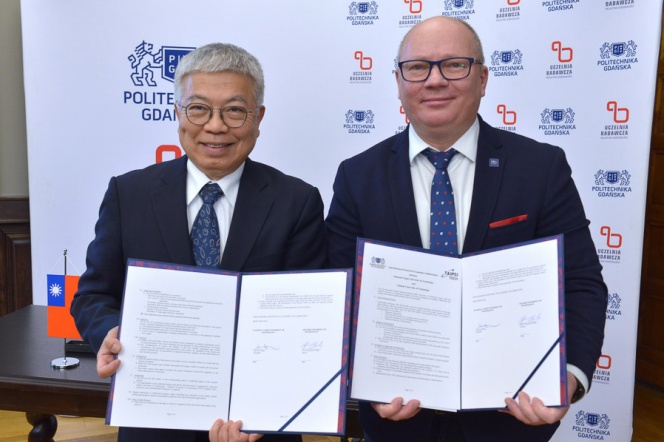Date added: 2023-03-09
Partnership Agreement with Tajpei Tech

National Tajpei University of Technology was founded in 1912 and is one of the lead public universities in Taiwan, educating 13 thousand students at 19 faculties. The University is also a strong center of cooperation of science with the industry and business – 10% of the chief executive officers and board members employed in companies in Taiwan are graduates of Tajpei Tech, and the university supports 25 new star-ups each year.
A delegation from National Tajpei University of Technology came to Gdańsk University of Technology including: Prof. Sea-Fue Wang, the President of Tajpei Tech, Prof. Chung-Kuang Yang, the Vice-President, Prof. Ho-Chiao Chuang, Head of the Office of Research and Development, and Prof. Tun-Wen Pai, Head of the Office of International Affairs. The goal of the visit was to sign a new University-wide partnership agreement with Gdańsk University of Technology (the cooperation was based on a contract with the Faculty of Electronics, Telecommunications and Informatics).
The guests from Taiwan met with the authorities of the University in the Senate Hall – Prof. Krzysztof Wilde, the Rector of Gdańsk University of Technology, Prof. Janusz Nieznański, Vice-Rector for Internationalization and Innovation and Prof. Sławomir Milewski, Vice-Rector for Scientific Research. The meeting was also attended by DSc PhD Christian Jungnickel , Rector's Representative for Cooperation with Asian Higher Education Institutions and Anna Modrzejewska, Head of the International Relations Office, and the representatives of the Faculty of Architecture, Chemistry, Mechanical Engineering and Ship Technology, Electronics, Telecommunications and Informatics, as well as Applied Physics and Mathematics.
Scientific cooperation
The purpose of the agreement signed between Gdańsk University of Technology and National Taipei University of Technology is to strengthen cooperation in international research projects and to raise the level of scientific research.
- We are glad that the agreement with Taipei Tech is not just a general declaration of cooperation, but an announcement of important research projects in key areas for both universities, such as materials science, environmental protection, including green energy and eco-construction, electrical engineering, mechatronics, information technology, medical technology and biotechnology. – said Prof. Krzysztof Wilde.
Under the signed agreement, researchers at both universities will be able to apply for grants in order to conduct joint scientific research. The agreement was signed for a period of 5 years with the possibility of its extension.
Projects for students
During the discussions, the representatives of both universities agreed that in the future cooperation between Gdansk University of Technology and National Taipei University of Technology should involve not only scientists, but also students and doctoral students. Such opportunities are provided by, among others, the Erasmus+ program and cooperation of the program countries with partner countries, or scholarship programs offered by the National Agency for Academic Exchange (NAWA), which was discussed during the meeting by the representatives of Gdansk University of Technology.
National Taipei University of Technology also offers activities aimed at students, including international students. These include International PBL (Problem Based Learning) Competition Program, during which teams made of students from different countries are tasked with finding a solution to a given problem (during previous editions of the competition, the tasks involved humanoid robots and aerial rescue).
-
2026-01-28
Intensive language preparatory courses

